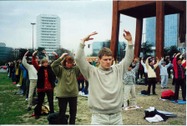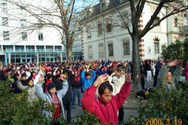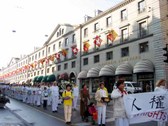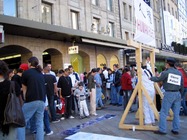As Marketing Manager of a transnational communication company, Martin from Baden-Wuerttemberg frequently travels around the world on business. He has Masters Degrees in both Engineering and Business Administration, together with honest and discerning eyes and a slightly balding head typical of a man in his forties. Martin’s capability of being a technical specialist and a businessman at the same time has never been questioned. Martin and his Taiwanese wife live a wealthy and trouble-free life in Ulm, a pretty town in Germany. However, there is one issue of vast and far-reaching significance that is never far from his mind.
In March every year, he would especially take a few days or even a few weeks off and go to Geneva with his wife or other people. This was different from his business trips because he travelled there for the sake of other people’s lives. Instead of making money, he uses his own savings to help fellow Falun Gong practitioners who are suffering persecution in China. At the Palais des Nations in front of the Geneva United Nations building, Martin and fellow practitioners from across the world demonstrate Falun Gong exercises and hold press conferences to call upon the United Nations Commission on Human Rights to help stop the suppression of Falun Gong in China. They also visit the U.N. building to take part in or sponsor human rights symposiums. They go onto the streets of Geneva to hold parades, distribute flyers and collect petition signatures, and they conduct art exhibitions in the Art Centre to expose the persecution of Falun Gong. In addition, they have faced interference from organisations sent to Geneva by the Chinese Communist Party.
 |  |
| Falun Gong practitioners’ group practice at the Palais des Nations in Geneva on March 20th 2000. | Falun Gong practitioners’ group practice in front of the Geneva Youth Hostel on March 19th 2000. |
Since the year 2000, each March and April there are one to two thousand Falun Gong practitioners from Europe, Asia, Australia, North America and South America going to Geneva to raise awareness of the persecution against Falun Gong in China. For instance, practitioners from Germany, a neighbouring country of Switzerland, usually pool their resources to drive to Geneva by sharing the cost of the petrol. It takes five or six hours to drive from Baden-Wuerttemberg where Martin lives to Geneva. The cost for the trip is shared by five practitioners who take the trip together. It is also quite common that forty to fifty practitioners rent a bus together.
Before their trips, practitioners book the most inexpensive hotels in Geneva, hotels rebuilt from old underground air-raid shelters, or they book into youth hostels. One hotel room usually contains from ten to thirty sleeping places, either bunk beds or a big wide bed. Practitioners bring their own sleeping bags and simple moisture-proof mats. It seems that one is unable to find a cheaper place in Geneva because the prices there are so high. As for food, practitioners often eat fast food or they go to supermarkets to buy bread, cheese and sausages to make sandwiches. Some cheap hotels are also equipped with dishware and stoves, which is very helpful for Chinese practitioners who are not used to western food. Taking part in activities outside for a whole day and being unable to have a hot meal, practitioners are happy to cook instant noodles after they go back to their accommodation. With some vegetables and seasonings, the noodles taste good.
It is not without reason that Falun Gong practitioners try to save money. Martin, who has a good income, also lives in the cheap youth hostel, which does not match his social status. Just like other practitioners of Falun Gong, Martin and his wife spend their weekends and vacations helping fellow practitioners who are persecuted in China. In Germany, almost every weekend, there will be one or two information booths set up at different places. Some practitioners demonstrate the Falun Gong exercises, some re-enact the torture methods used against fellow practitioners in China, some distribute flyers and others talk to passersby. Martin and his wife often participate in these activities. They use their own savings to print Falun Gong leaflets and newspapers or to make Video-CDs in German and Chinese. They also print large posters and spend their own money to buy props for the anti-torture exhibition. All of these things cost quite a lot of money. Over the past few years, people could see Martin and his wife not only in Germany, but also in large-scale activities and experience sharing conferences in North America. Of course, each time, they planned their budget very carefully.
Martin’s friend, Mr. Wu, who also lives in Baden-Wuerttemberg, comes to Geneva almost every year at his own expense. A few years ago, he was still a student. It’s said that his trip was funded through savings from his daily food expenses. Mr. Wu, who comes from Mainland China, said, “I’m now living in a democratic society where I can enjoy the human rights that a person should have. However, I cannot forget those people who are unable to enjoy their basic human rights. In China, some people even lost their lives for upholding their beliefs.”
Sacrificing his own time and money to oppose the persecution is important to Mr. Wu. He said, “I believe all of these things are very meaningful. I take part in Falun Gong activities, including going to Geneva to appeal on behalf of Falun Gong to the United Nations Commission on Human Rights. I do this from my own conscience. Who could possibly offer money to buy my conscience? Of course, I pay for my own expenses. Some don’t believe that many people are willing to spend so much effort and money not for the sake of their own benefits. In fact, it is straightforward to understand the reason. The principles of Truthfulness-Compassion-Tolerance that Falun Gong teaches not only awakened my conscience but also awakened the conscience of thousands and even millions of people. Among the millions of people, a small part who can afford time and expense come to Geneva. That is how in March and April every year, there would be one to two thousand practitioners taking part in activities in Geneva.”
* * *
You are welcome to print and circulate all articles published on Clearharmony and their content, but please quote the source.












 more ...
more ...